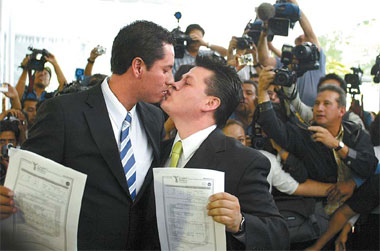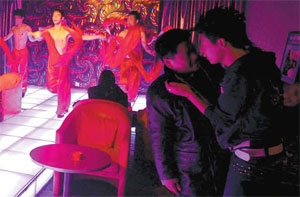| Home / Health / News | Tools: Save | Print | E-mail | Most Read |
| Nothing Unnatural About It but It's Still a Taboo |
| Adjust font size: |
The bar is dimly lit. The music is soft and melodious. People are speaking in hushed tones. The ambience is perfect for the bright sophomore. And he knows it, for he seems to be in a trance with his dancing partner. A voice is heard above the music: "Take bigger steps to keep pace with your partner." After all, dance is all about proper chemistry. That doesn't sound unusual. But then Xiaofan (name changed) was dancing in a gay bar. And the voice was his mother Chen's.
More surprise follows as the mother of the university student in Wuhan, capital of central China's Hubei Province, says: "I could never have imagined you had so many nice friends in the circle." But things were not always like this for Xiaofan. He was like any other adolescent boy in school, only a bit shy. But unlike his classmates, he was always attracted to boys, and cursed himself for that. "I hated myself for being different from the others and dared not tell anyone," he says. "The pressure was killing, and I even attempted suicide." Then after entering university in 2005, he decided to share his secret. And the first person that came to his mind was his mother. "She was shattered. But she didn't scold me," Xiaofan recalls. "She just kept asking me, 'why?' I couldn't answer that." Chen took her son to a psychiatrist because she thought his "condition was some kind of mental disorder and could be cured". But she was greatly disappointed. The doctor told her clearly that her son was not suffering from any mental disorder. "I knew little about homosexuality two years ago. After all, people are born male and female to procreate. That's nature. Same-sex love was unnatural to me," Chen says. "But I was not as much saddened by my son's gender preference as by the hard struggle he had to go through to accept his sexuality. "But I knew I had to help him accept reality and ignore the social shame still associated with it. Or else, he may be driven to despair to drugs or drinks or even suicide. His happiness is what I care the most about." The day Xiaofan admitted to having a 419 (one-night stand - the Chinese pronunciation sounds similar) with a stranger, Chen burst out crying. She shouted: "Please stop doing things risking your health and life. Find a proper partner." Her worry was justifiable. One-night stands and multiple partners are not uncommon among homosexuals. Chinese Center for Disease Control and Prevention (CDC) figures show the largest susceptible group to HIV/AIDS after drug users are homosexual men. But though Chen says she wants to see her son happy, she secretly wishes he were "normal". "Quite frankly, even now I dream that one day he'll be like the other boys when the right girl comes along," she says. But she will not force him to get married. "It takes time for parents of gay children to accept reality. Their understanding matters a lot, however," says Professor Zhang Beichuan, China's leading scholar in homosexual studies. Xiaofan knows that he has an extremely understanding mother, and acknowledges the fact. "I'm grateful to my mother for her understanding. Her support and love lifted me out of the mire of despair. Today, I feel even closer to her," he says. Right now, he is dating a man seven years elder to him. In fact, Xiaofan is one of the luckier few among China's estimated 30 million gay men because despite the increasing social tolerance toward the group, the general attitude of the people is still far from normal. According to a recent survey conducted by Zhang, more than half of the 2,500 gay
Some parents even disown their gay children and throw them out of the house, says Zhang. He cites the tragedy of Qilu (name changed), a 20-something young man from east China's Shandong Province to say some non-acceptances end in disasters. At the age of 18, Qilu found that he loved a man. He was expelled from school soon after his sex orientation was known in 2005. Later that year, he took his boyfriend home. But his farmer father could not accept the "twisted sexuality" of his son. And since he couldn't stop his son from "indulging in unnatural behavior", he killed his lover. He was arrested and jailed. Qilu left home after the incident. "It's because of my fault that my beloved boyfriend is dead and my family destroyed. How can I face up to my parents and the life ahead?" says Qilu, who still misses his mother. More than half the unmarried gay men face parents' pressure to get married, says Zhang, quoting the survey results. That's one of the major reasons why nearly 20 percent of those polled attempted to or succeeded in killing themselves. Some have devised a way to keep their sexuality under wraps, and go by their parents' wishes because that's the only they "can continue with their lives". "I will definitely get married after graduation. Only that way can I keep the secret that I'm gay, especially from my parents," says Su Xin, a 23-year-old senior student of a Wuhan university. Zhang says 90 percent gay men bow to parents' pressure and social norms. But in most cases such marriages become "hell" both for the men and their wives. "We don't look down upon left-handers, so we shouldn't discriminate against gays either. Parents, as the dearest and closest people to their children, should stand in the front line to defend their children and help society give up the taboos associated with homosexuality," Zhang says. Xiaofan's mother agrees. "If we parents reject or pressure our gay children, how can we count on others in society to accept them?" she says. She is one mother that Xiaofan's gay friends feel indebted to. Though he concedes it's very difficult for parents of gay children to accept reality at first, Zhang says: "If my son were gay, I would ask him to be a good gay, who takes life with a smile and faces social pressure bravely. I would tell him that he should still focus on studies and try every means to lead a healthy life. Parents who deliver the right and positive messages to their gay children should be respected by society." For Zhang, Sun Dehua is the role model for parents of gay children. The 58-year-old resident of Dalian in northeast China's Liaoning Province opened China's first hotline in September 2006 to help parents understand their gay children. Apart from that, he has worked as a volunteer to raise HIV/AIDS awareness among the local gay community. "At first, I took gay people to be freaks. But gradually, I realized their love was genuine, too," says Sun. "I was deeply moved and felt obliged to show my support and understanding to them." Such is the respect he enjoys that gay people in Dalian call him "Daddy of all comrades (colloquial term for gays in Chinese). It seems gays could do with a few more Suns. (China Daily June 12, 2007) |
| Tools: Save | Print | E-mail | Most Read |
 |
| Related Stories |

